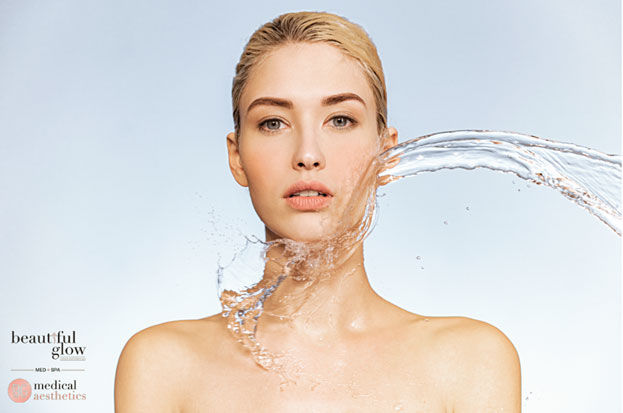
Hydrating the skin is just like hydrating the body to look and feel its best. Scientifically, moisturizer is an umbrella term for moisturizer types: emollients (fats and oils), squalene (oil), humectants, and occlusive.
There is no gold standard for what defines a hydrator and a moisturizer – brands use these terms to differentiate how your skin gets the moisture it needs.
Moisturizers are oil-based ingredients and include occlusive agents such as petrolatum or mineral oil, and emollients like esters and plant oils. They work by creating a seal on the surface of skin that prevents water from escaping. They also make the skin feel smoother and less dry.
Hydrators are ingredients called humectants, such as glycerin or hyaluronic acid, that absorb water from the atmosphere or your skin and hold it in place on your skin.
What’s best for my skin type?
- If you have dry skin, try a thicker moisturizer.
- If your skin is naturally dry year-round and tends to flake or peel, chances are, your skin just has a hard time retaining moisture.
- A thick, emollient moisturizer will help prevent water from leaving your skin and, with the right formula, will provide the nutrients and nourishment your complexion needs to thrive all winter long.
- If your skin is really dry, something with petrolatum (petroleum jelly) works the best; but if you want to avoid petrolatum, then shea butter or canola oil or soybean oil can work.
- If you have dehydrated skin, try a hydrating serum.
- If your skin is dehydrated, you need to actively add water back into the skin.
- Look for a hydrating serum with hyaluronic acid, which retains an impressive 1000 times its weight in water – and will add a healthy dose of hydration back into the skin.
- Hydrate from the inside out by drinking plenty of water.
- A good goal is to drink at least half of your body weight in ounces of water every day.
- Add water-rich foods such as watermelon, strawberries, and cucumber.
- If you have oily skin, try water-based hydrators and moisturizers.
- People with oily skin often have compromised barrier function, which makes it hard for their skin to retain moisture. As moisture leaves the skin, it becomes dehydrated, causing the skin to produce more oil.
- Look for water-based, non-comedogenic hydrators and moisturizers. Water-based products will feel lighter on the skin and won’t clog your pores.
Which is better: Hydrator or Moisturizer?
Both. It all depends on your skin type and most common creams do both. It doesn’t hurt to use both a moisturizer and hydrator.
Here’s a handy ingredient table to help determine whether you are keeping your skin healthy with the right ingredients:
| Ingredient | Moisturizer (Occlusive) or Hydrator (Humectant) |
|---|---|
| Hyaluronic Acid | Hydrator |
| Glycerin | Hydrator |
| Aloe | Hydrator |
| Honey | Hydrator |
| Nut or Seed Oil (Coconut, Almond, Hemp) | Moisturizer |
| Shea Butter | Moisturizer |
| Plant Oil (Squalene, Jojoba, Rosehip, Tea Tree) | Moisturizer |
| Snail Mucin | Hydrator |
| Mineral Oil | Moisturizer |
| Lanolin | Moisturizer |
| Lactic Acid | Hydrator |
| Citric Acid | Hydrator |
| Ceramide | Neither (Ceramides strengthen the skin’s barrier to help prevent moisture loss) |
